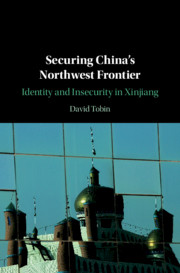Book contents
- Securing China’s Northwest Frontier
- Securing China’s Northwest Frontier
- Copyright page
- Dedication
- Contents
- Figures
- Abbreviations
- Introduction
- 1 Securing China on the Multi-Ethnic Frontier
- 2 Mass Education as an Identity-Security Practice
- 3 ‘East Turkestan’ in China’s Identity and Security Narratives
- 4 Identity and Insecurity after ‘7-5’
- 5 Performing Inclusion of the Uyghur Other
- 6 Han and Uyghur Narratives on Ethnic and National Identity
- 7 Han and Uyghur Narratives on Identity and Insecurity
- Conclusion
- Book part
- Bibliography
- Index
1 - Securing China on the Multi-Ethnic Frontier
Published online by Cambridge University Press: 18 September 2020
- Securing China’s Northwest Frontier
- Securing China’s Northwest Frontier
- Copyright page
- Dedication
- Contents
- Figures
- Abbreviations
- Introduction
- 1 Securing China on the Multi-Ethnic Frontier
- 2 Mass Education as an Identity-Security Practice
- 3 ‘East Turkestan’ in China’s Identity and Security Narratives
- 4 Identity and Insecurity after ‘7-5’
- 5 Performing Inclusion of the Uyghur Other
- 6 Han and Uyghur Narratives on Ethnic and National Identity
- 7 Han and Uyghur Narratives on Identity and Insecurity
- Conclusion
- Book part
- Bibliography
- Index
Summary
Chapter 1 analyses how historical contexts of empire, nationalism, and ethnic relations shape identity and security narratives in contemporary nation-building practices in Xinjiang. The chapter shows that China historically understood Xinjiang through imperial geopolitical prisms, which ambivalently shifted towards cultural nationalism and included Uyghur identity as a security concern. The first section builds on nationalism literature and analyses Chinese nation-building as historically contingent processes of cultural governance of relations between Han and non-Han on the frontier. It shows how mid-twentieth century articulation of territorially bounded nationhood matter co-exists with imperial, pre-modern framings of difference between civilisation and barbarians. The second section uses official Chinese sources and secondary literature on Xinjiang history to analyse how Xinjiang’s position shifted from imperial vassal to a central component in struggles to build a modern, multi-ethnic Chinese national identity. The final section uses official Chinese sources and secondary literature on ethnic relations to explore how nation-building conceptualises and organises ethnicity. Chinese nation-building produces ethnic boundaries in Xinjiang by articulating and securitising hierarchical relations between Han majority and ethnic minorities. The chapter shows how Xinjiang’s ambivalent inclusion as an exotic frontier and indivisible component of a territorial state reflects and produces tensions in China’s national narratives.
- Type
- Chapter
- Information
- Securing China's Northwest FrontierIdentity and Insecurity in Xinjiang, pp. 27 - 58Publisher: Cambridge University PressPrint publication year: 2020

